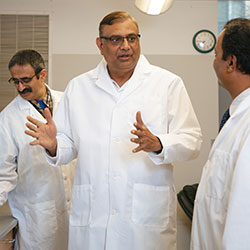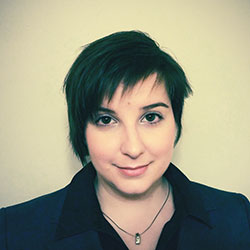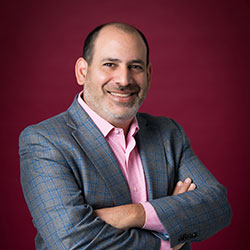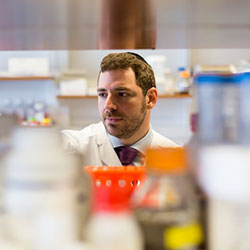Research Labs

The James and Eillen Dicke Urology Research Laboratory
Sanjay Gupta, PhD
Professor & Endowed Chair, Department of Urology, School of Medicine
Dr. Sanjay Gupta’s research involves basic, translational and clinical areas of focus. He has made ground-breaking contributions to the fields of cancer biology, epigenetics and pharmacology, in particular, identification of biomarkers and targets, development of prognostic models and application of small molecules for prevention and therapy of cancer. His recent interest is on development of new technologies based on artificial intelligence and bio-printing based cancer model systems.

Grabowska Lab
Magdalena M. Grabowska, PhD
Assistant Professor, Department of Urology, Case Western Reserve University
The Grabowska Lab focuses on genitourinary conditions like prostate cancer, benign prostatic hyperplasia, and bladder cancer. The team of researchers uses patient tissues, pre-clinical models, and cell lines to understand how these conditions develop and acquire therapeutic resistance to standard therapies. We collaborate with clinical, basic, and translational researchers to create an interdisciplinary research program to better understand these diseases with the goal of improving patient outcomes.

Hijaz Lab
Adonis Hijaz, MD
Vice Chair Academic & Research, Urology Institute
Dr. Adonis Hijaz is the Lester Persky Professor of Urology at CWRU and is a specialist in female pelvic medicine and reconstructive surgery. Over the last 15 years, he has conducted clinical, basic science and translational research on the topic of urinary incontinence. The focus of the his research Laboratory at CWRU has been on the study of the mechanisms and pathophysiology of stress urinary incontinence (SUI) with focus on the role of mesenchymal stem cells (MSCs) in the treatment of SUI. Research conducted in his laboratory has also investigated the role of stem cell homing chemokines in the treatment of SUI. Dr. Hijaz’s laboratory has specific strength in development of small animal models of urinary incontinence with an emphasis on models that investigate mechanisms of childbirth injury to the urethral continence mechanism. The goal of this research to harness the knowledge of mechanisms of recovery in the development of pathophysiologically-based treatment alternatives that emphasizes early intervention. In addition to the former field of research, the laboratory has collaboration with departments of biomedical engineering and Mechanical and Aerospace Engineering. The collaboration has focused on innovative solutions for pelvic floor and incontinence repair with next generation biodegradable biotextile material. This collaboration has received funding from local, state and federal sources to validate and further develop the technology. In the most recent years, the team has been investigating he role of immune-regenerative macrophages in the treatment SUI. The laboratory has been supported by NIH and by the Lester Persky Endowment.

Shoag Research
Jonathan Shoag, MD
In an effort to develop precision tools for cancer care, Jonathan Shoag, MD conducts translational and clinical research focused on bringing large data, genomic sequencing and novel AI and statistical techniques for better patient outcomes. More specifically, Dr. Shoag’s objective is to identify drugs that have activity against the normal prostate and can be used to understand and treat prostate cancer. The Damon Runyon Cancer Research Foundation supports Dr. Shoag’s novel approaches to apply novel statistical and machine learning approaches on large scale clinical data to discover new therapies and pathways important in prostate cancer. He will then test these therapies in genetically engineered and patient-derived prostate cancer models. Identifying active drugs against prostate cancer that are already FDA-approved or have been previously studied in clinical trials for other cancers can aid in understanding prostate cancer biology and can rapidly benefit patients with advanced disease.


